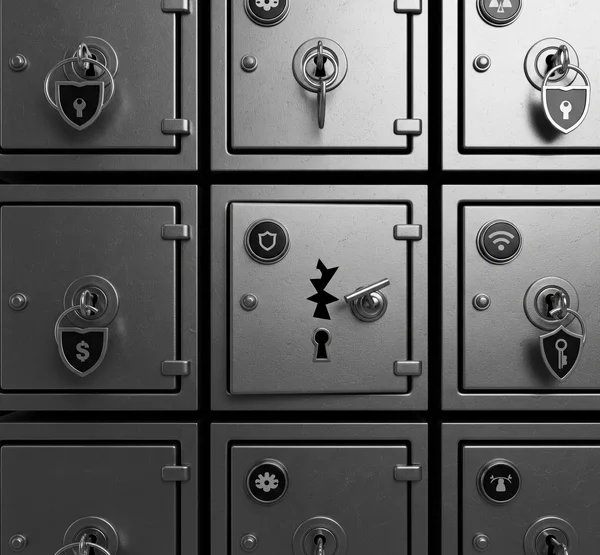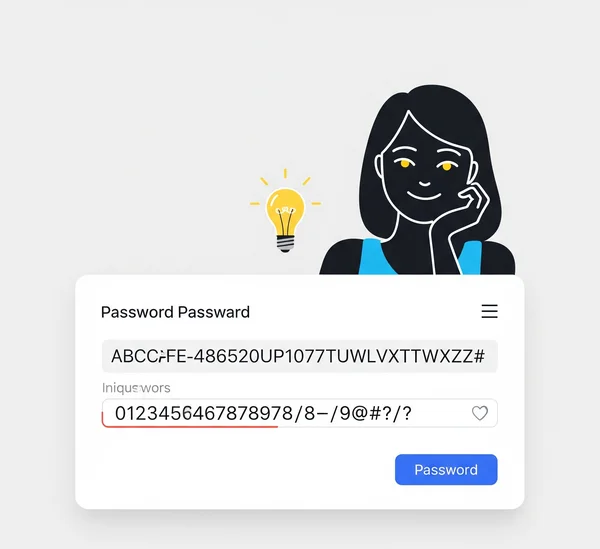Stop Reusing Passwords! Why It's Risky & How a Generator Helps
In our digital lives, we juggle numerous online accounts, each requiring a password. It's tempting to simplify things by reusing the same password across multiple sites – a common practice known as password reuse. But why is password reuse bad? This seemingly convenient habit is one of the biggest threats to your online safety. This article will unmask the severe dangers of password reuse, explain the critical importance of unique passwords, and show how a password generator offers an effortless solution. Ready to significantly boost your account security? Learn how to create strong, unique credentials easily.
The Alluring Trap: Why Do We Keep Reusing Passwords?
Before diving into the risks, it's worth understanding why password reuse is so prevalent. Why do so many people reuse their passwords?
The Convenience Factor: "Too Many Passwords to Remember"
The primary driver is convenience. With dozens, sometimes hundreds, of online accounts, the thought of creating and remembering unique passwords for each one feels overwhelming. Reusing a familiar password seems like an easy shortcut.
Underestimating the Real-World Risks
Many users simply underestimate the potential fallout from password reuse. They might think, "It won't happen to me," or "My accounts aren't that important." Unfortunately, hackers exploit this mindset. This leads to poor password hygiene.
Habit and Lack of Awareness
For some, password reuse is simply a long-standing habit formed before the current landscape of widespread data breach incidents. A lack of awareness about specific attack vectors like credential stuffing also contributes to this dangerous practice.
Unpacking the Risks: How Password Reuse Exposes You
The convenience of password reuse comes at a steep price. How does password reuse expose you to significant cybersecurity risks?
Credential Stuffing: The Hacker's Favorite Trick
This is the number one danger. When a website suffers a data breach, hackers often obtain lists of usernames and passwords. They then use automated tools to "stuff" these stolen credentials into login forms across countless other websites (banks, email, social media). If you've reused your password, a breach on one site can instantly grant them access to your other, more valuable accounts. This is a common method for account takeover.

How One Data Breach Can Compromise Multiple Accounts (Domino Effect)
Think of password reuse as giving a thief a master key. If they get that key from any lock (any breached website), they can try it on all your other doors (your other online accounts). A single compromised password can lead to a cascade of security failures, impacting your digital security across the board.
Real-Life Examples of Password Reuse Disasters
Numerous high-profile data breach incidents have highlighted the devastation caused by password reuse. Attackers leverage lists of exposed credentials from one service to successfully infiltrate accounts on entirely different platforms, leading to financial loss, identity theft, and reputational damage.
Increased Vulnerability to Phishing and Targeted Attacks
If an attacker obtains a password you reuse through a phishing scam targeting one account, they can then attempt to use that same password to access your more sensitive accounts, compounding the damage from the initial attack.
The Power of Unique Passwords: Your First Line of Defense
The antidote to the dangers of password reuse is simple in concept yet powerful in practice: using unique passwords for every single online account.
Containing the Damage: Limiting Breach Impact to One Account
When each account has its own distinct password, a data breach on one website doesn't automatically compromise your other accounts. The damage is contained. While losing access to one account is bad, it's far preferable to having your entire online presence compromised due to password reuse.

Making Credential Stuffing Attacks Ineffective
Unique passwords render credential stuffing attacks largely useless. If the stolen password from Site A doesn't work on Site B, Site C, or your email, hackers hit a dead end with that particular credential.
A Cornerstone of Good Secure Password Habits
Consistently using unique passwords is a fundamental pillar of good secure password habits. It's a proactive step you can take to significantly reduce your vulnerability to common cyber threats and improve your overall online safety.
Breaking the Habit: How a Password Generator Creates Unique Passwords Effortlessly
"But how can I possibly create and remember so many unique passwords?" This is where a strong password generator becomes an invaluable ally. How to stop reusing passwords effectively involves leveraging the right tools.
Instant Generation of Strong, Random, and Unique Credentials
A password generator creates strong, random, and, most importantly, unique passwords with a single click. You no longer have to struggle to come up with new, complex combinations for each account.
Eliminating the Mental Burden of Devising New Passwords
One of the key password generator benefits is that it removes the mental strain of password creation. It handles the complexity, ensuring each new password meets high security standards without any effort on your part, directly combating the main reason for password reuse.

Key Password Generator Benefits for Avoiding Reuse
Using a password generator means every new account gets a fresh, unique password, tailored to be strong and secure. This practice, when consistently applied, systematically eliminates the risks associated with password reuse.
Try Our Strong Password Generator for Unique Credentials and see how easy it is to enhance your security.
Beyond Generation: Storing Your Unique Passwords Safely
Okay, so a password generator solves the creation of unique passwords. But what about remembering them all?
The Challenge of Remembering Dozens of Unique, Complex Passwords
It's humanly impossible to memorize dozens, if not hundreds, of strong, random, unique passwords. Attempting to do so often leads back to weak password creation or, ironically, password reuse.
How a Password Manager Securely Stores and Auto-Fills Them
This is where a password manager comes in. A password manager is a secure, encrypted vault that stores all your unique passwords. You only need to remember one strong master password to unlock the manager. It can then auto-fill your credentials on websites and apps.

Using a Generator and Manager in Tandem for Optimal Security
The best practice for account security involves using a password generator to create strong, unique passwords and a password manager to store them securely. These two tools work together perfectly to overcome the challenges that lead to password reuse.
Embrace Unique Passwords for True Peace of Mind
The message is clear: password reuse is a dangerous gamble with your digital security. The convenience it offers is vastly outweighed by the severe risks of account takeover and widespread compromise following a data breach.
Embracing the habit of using strong, unique passwords for every online account is one of the most effective steps you can take to protect yourself. With tools like a reliable password generator to create these credentials and a password manager to store them, maintaining excellent password hygiene is easier than ever. Stop the reuse cycle today for true peace of mind.
What's your biggest hurdle in using unique passwords for every account? Generate your next strong, unique password with our tool now and share your thoughts below!
Password Reuse and Unique Passwords FAQs
Q1: Is it really that bad if I reuse passwords for unimportant accounts?
A: Yes, it's still risky. Hackers can use "unimportant" accounts (like old forums or newsletters) to gather information about you for more targeted attacks. Also, a breach on an "unimportant" site still exposes that reused password, which they will try on your more important accounts. It's best practice to use unique passwords everywhere.
Q2: How many unique passwords do I actually need?
A: You need one unique password for every single online account you have – no exceptions. Each account is a potential entry point if its password is compromised and reused elsewhere.
Q3: Won't using a password generator just give me passwords I can't remember?
A: Yes, and that's the point! Strong, randomly generated unique passwords are designed to be hard to remember. That's why they are almost always used in conjunction with a password manager, which securely stores and remembers them for you. Our password generator creates them, and a manager helps you use them.
Q4: What's the easiest way to start creating unique passwords for everything?
A: The easiest way is to start now with your most important accounts (email, banking, social media). Use a strong password generator to create new, unique passwords for them. Then, gradually work through your other accounts. A password manager will be essential for this process.
Q5: How does your password generator ensure the passwords it creates are unique each time?
A: Our password generator uses robust randomization algorithms. Each time you click "generate," it creates a new, statistically independent random string based on your selected criteria (length, character types). While true "uniqueness" over infinite generations can't be absolutely guaranteed in a theoretical sense without storing past results (which we don't for privacy), the probability of generating the exact same complex password twice is astronomically small, making each generated password effectively unique for practical security purposes. You can experience this randomization with our tool.